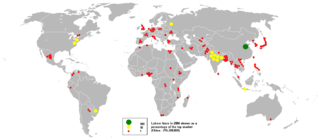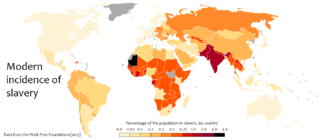
The Ministry of Agriculture, Fisheries and Food (MAFF) was a United Kingdom government department created by the Board of Agriculture Act 1889 and at that time called the Board of Agriculture, and then from 1903 the Board of Agriculture and Fisheries, and from 1919 the Ministry of Agriculture and Fisheries. It attained its final name in 1955 with the addition of responsibilities for the British food industry to the existing responsibilities for agriculture and the fishing industry, a name that lasted until the Ministry was dissolved in 2002, at which point its responsibilities had been merged into the Department for Environment, Food and Rural Affairs (Defra).

The Scottish Office was a department of the United Kingdom Government from 1885 until 1999, exercising a wide range of government functions in relation to Scotland under the control of the Secretary of State for Scotland. Following the establishment of the Scottish Parliament in 1999, most of its work was transferred to the newly established Scottish Executive, with a small residue of functions retained by the Scotland Office.

The first MacDonald ministry of the United Kingdom lasted from January to November 1924. The Labour Party, under Ramsay MacDonald, had failed to win the general election of December 1923, with 191 seats, although the combined Opposition tally exceeded that of the Conservative government creating a hung parliament. Stanley Baldwin remained in office until January 1924.

The second MacDonald ministry was formed by Ramsay MacDonald on his reappointment as Prime Minister of the United Kingdom by King George V on 5 June 1929. It was only the second occasion on which the Labour Party had formed a government; the first MacDonald ministry held office in 1924.

Mary Helen Creagh is a British Labour politician who has represented Wakefield as its Member of Parliament (MP) since 2005.

The Poor Law Amendment Act 1834 (PLAA), known widely as the New Poor Law, was an Act of the Parliament of the United Kingdom passed by the Whig government of Earl Grey. It completely replaced earlier legislation based on the Poor Law of 1601 and attempted to fundamentally change the poverty relief system in England and Wales. It resulted from the 1832 Royal Commission into the Operation of the Poor Laws, which included Edwin Chadwick, John Bird Sumner and Nassau William Senior. Chadwick was dissatisfied with the law that resulted from his report. The Act was passed two years after the 1832 Reform Act extended the franchise to the middle classes. Some historians have argued that this was a major factor in the PLAA being passed.

Clement Attlee was invited by King George VI to form the Attlee ministry in the United Kingdom in July 1945, succeeding Winston Churchill as Prime Minister of the United Kingdom. The Labour Party had won a landslide victory at the 1945 general election, enacting much of the post-war consensus policies, especially the welfare state and nationalisation of some industries. The government was marked by post-war austerity measures, in giving independence to India, and engagement in the Cold War against Soviet Communism.
The National Dock Labour Board (NDLB), which administered the National Dock Labour Scheme, was an administrative board for the operation of British docks.
The Agricultural Wages (Regulation) Act 1924 was an Act of Parliament in the United Kingdom passed in 1924 by the minority Labour Government.
Minimum wage law is the body of law which prohibits employers from hiring employees or workers for less than a given hourly, daily or monthly minimum wage. More than 90% of all countries have some kind of minimum wage legislation.

The First Labour Government of New Zealand was the government of New Zealand from 1935 to 1949. Responsible for the realisation of a wide range of progressive social reforms during its time in office, it set the tone of New Zealand's economic and welfare policies until the 1980s, establishing a welfare state, a system of Keynesian economic management, and high levels of state intervention. The government came to power towards the end of, and as a result of, the Great Depression of the 1930s, and also governed the country throughout World War II.

Labour in India refers to employment in the economy of India. In 2012, there were around 487 million workers in India, the second largest after China. Of these over 94 percent work in unincorporated, unorganised enterprises ranging from pushcart vendors to home-based diamond and gem polishing operations. The organised sector includes workers employed by the government, state-owned enterprises and private sector enterprises. In 2008, the organised sector employed 27.5 million workers, of which 17.3 million worked for government or government owned entities.
The Statute of Artificers 1563 was an Act of Parliament of England, under Queen Elizabeth I, which sought to fix prices, impose maximum wages, restrict workers' freedom of movement and regulate training. The causes of the measures were short-term labor shortages due to mortality from epidemic disease, as well as, inflation, poverty, and general social disorder. Local magistrates had responsibility for regulating wages in agriculture. Guilds regulated wages of the urban trades. Effectively, it transferred to the newly forming English state the functions previously held by the feudal craft guilds. The measure sought to make agriculture a trade and a national priority of employment.
Indian labour law refers to laws regulating labour in India. Traditionally, Indian governments at federal and state level have sought to ensure a high degree of protection for workers, but in practice, this differs due to form of government and because labour is a subject in the concurrent list of the Indian Constitution.
The following article presents a Timeline of the Poor Law system from its origins in the Tudor and Elizabethan era to its abolition in 1948.
The Scottish Agricultural Wages Board (SAWB) is an executive non-departmental public body of the Scottish Government. It sets minimum pay rates and other conditions for agricultural workers, as set out in the Agricultural Wages (Scotland) Order (No.59).

Debt bondage in India or Bandhua Mazdoori was legally abolished in 1976 but it remains prevalent, with weak enforcement of the law by governments. Bonded labour involves the exploitive interlinking of credit and labour agreements that devolve into slave-like exploitation due to severe power imbalances between the lender and the borrower.

The Minimum Wages Act 1948 is an Act of Parliament concerning Indian labour law that sets the minimum wages that must be paid to skilled and unskilled labours.
The Inter-State Migrant Workmen Act, 1979 is an Act of the Parliament of India enacted to regulate the condition of service of inter-state labourers in Indian labour law. The Act's purpose is to protect workers whose services are requisitioned outside their native states in India. Whenever an employer faces shortage of skills among the locally available workers, the act creates provision to employ better skilled workers available outside the state.










